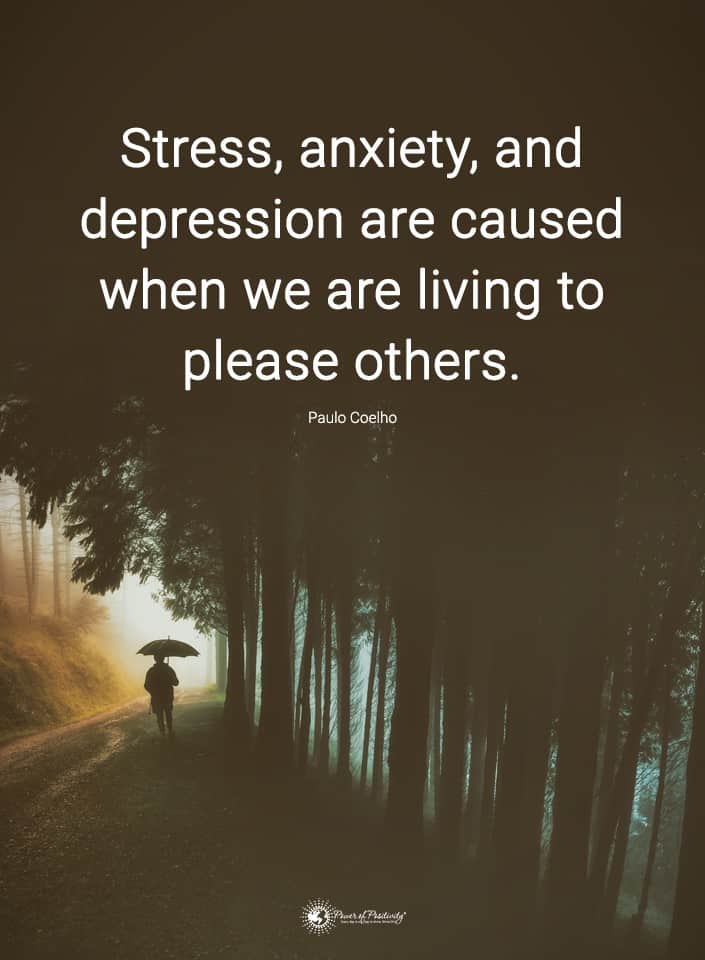Many people make jokes about being introverts and liking alone time, and that’s perfectly fine! But trouble may arise when being alone morphs into feeling lonely, leaving you feeling alienated from others, socially isolated, and anxious for some company. Overall, that negatively impacts your mental well-being
On the surface, loneliness doesn’t seem like that big of a deal. You might even think that you need to “suck it up” and learn to love being around yourself more if you feel lonely. Again, that’s not an entirely false statement, but the reality is that social interaction is necessary for human life.
Human beings are naturally social creatures, and even the most introverted among us will suffer from feeling isolated and separated from others. Here are ten ways loneliness affects our health and mental wellbeing.
1. It Can Make It Harder To Cope With Stress
If you’ve ever been through a breakup, you’re probably very well aware of how having an excellent social support structure can often make or break this highly stressful situation. And it’s something that’s backed up by science too! A study showed that having a social group:
- Increases your mental resilience
- It affects your neurochemical response in positive ways
- Counteracts stressful influences from your environment
- Lowers your stress levels
By contrast, being lonely means you don’t get all of these valuable benefits. You may even be experiencing higher levels of stress by comparison – even when you’re relaxing.
And it’s not hard to see why – with the help of a support group, you’ll find a safe space to vent and people who are there to help you both mentally, physically, and financially whenever you’re struggling!
2. It May Lead To Unhealthy Behavior
Just how many times have you been kept away from making bad life choices, thanks to your loved ones looking out for you? Or even (jokingly and lovingly) threaten you into forming healthier habits? As it turns out, research proves that having positive social bonds in your life can:
- Encourage better eating
- Ensure you get enough sleep
- Force you to care for your physical health better
- Push you into exercising sufficiently
- Reduce the likelihood of you engaging in substance abuse
- Encourage positive thinking habits
Inversely, being on your own often influences you negatively. Examples include:
- It makes you more likely to drink excessively
- Increases your likelihood of smoking
- Increases substance abuse risks
- Elevates your chances of engaging in risky behaviors
3. It Can Cause Mental Well-being By Causing Depression
You may have noticed just how much more depressed you can be when you’re alone – and it’s not just your imagination, either. A study has shown that loneliness is a significant and notable risk factor in the development of depression.
It’s not too hard to figure out why, either. Because when you think about it, loneliness often means:
- You’re more likely to contemplate, which can lead you to focus on negative thoughts.
- You are more likely to be understimulated, which is a risk factor for developing depression.
- You’re deprived of a basic human need for social and emotional connectivity
- You increasingly struggle with positive thinking
These few factors often end up being more negative and self-focused in general, which can ultimately lead to depression.
4. It May Worsen Your Risk Of Suicide
It’s a pretty common trope in media that it’s the lonely, ignored person who ends up committing suicide. As grim and dark as it may be, it’s a storytelling convention that unfortunately has its roots in reality.
Research has shown that loneliness often increases the risk of suicidal ideations and, ultimately, suicide attempts. Here are a few reasons why there’s such a strong correlation between the two:
- It can exacerbate pre-existing mental problems that were previously going undetected or create new ones.
- Often, it makes it difficult for people to look for help
- It can feel like a problem with no other solution or end in sight – especially if there’s no clear and direct solution
- It can be a source of shame, as it feels like a problem we should be capable of overcoming
At the end of the day, humans are an incredibly social species. We cannot forget that the need for social interaction is an extremely fundamental part of us – and without it, we may end up turning to darker ends in desperation to solve that issue.
5. It Results In Inflammation
You may argue the connection between health and loneliness – or the lack of it – is unmistakable. If you’ve got friends looking out for you and pushing you to see the doctor when appropriate, then obviously, you’ll be physically better!
That is true, but research has shown it’s not the only linking connection. As it turns out, being a part of a social network also directly affects our physical bodies. More specifically, it helps regulate our inflammation response!
The most likely reason for this? It’s probably hardwired into our genetics and is crucial for our survival. This is because the body likely has to prep for the fact that lonely people:
- They are more likely to be attacked or seriously injured
- Are less likely to receive help and support
- Must be prepared to counteract increased infection risks on their own
- They can’t be cared for by others until they have fully recovered
As a result, your body tries to balance these possibilities by overcompensating with increased inflammation levels – a defense mechanism against potential injuries. Unfortunately, this can also ultimately lead to all sorts of health problems in the future too.
6. It Puts You At Risk Of Heart Disease
Loneliness can be heartbreaking – in more ways than one. Studies have noted that loneliness often increases the risk of cardiovascular diseases like stroke and coronary heart disease. Here are a few possible reasons as to why:
- You’re more likely to overlook signs of stress on your own
- You deal with more emotional burden and tension, with no way of relieving it
- You may be more inclined to resolve your issues in unhealthy ways
7. It May Cause You To Die Earlier
A common affectionate joke you may have in your social circles is “X will be the death of me!” – especially when you’re exasperated, even as you continue to love them. The opposite, however, is more likely to be true – you’re more likely to die because you don’t have them.
Studies have shown that loneliness:
- It can be just as harmful as smoking 15 cigarettes a day
- Increases your risk of premature death
- It is more harmful than air pollution, obesity, or even a sedentary lifestyle.
By contrast, the studies found that participants who had stronger social bonds had higher chances of survival – no matter who you are. So you can imagine just how badly loneliness can affect you!
8. It Can Worsen Eating Habits
If you’re already struggling with some form of disordered eating, loneliness will only worsen your mental well-being. A study has found that loneliness has a lot of characteristics that link it together to various eating disorders such as:
- Anorexia
- Bulimia
- Binge eating disorder
The result? Loneliness often ends up as a significant factor in rapid weight gain, loss, or even cycling between the two. But why is this the case?
- There is a misguided attempt to “eat away” the loneliness or numb the emotions.
- Instead of alternate, social-based stress relief methods, stress-eating often crops up as a coping mechanism against stress.
- Intense negative emotions that stem from skewed perceptions can mean loneliness feeds back into eating disorders and vice versa, fuelling each other.
So if you find yourself reaching for the fridge more often than before and find yourself hating it, try reaching out to your nearest club or society to make some friends. The reason behind your recent increase in snacking may very well be caused by loneliness.
9. It Can Make Interaction Even Harder, Impacting Your Mental Well-being
Why are you isolating yourself? What’s keeping you from connecting and interacting with others? With just how horrible the feelings of poor mental well-being can be, you would think that you’d jump at the first chance to make friends – but more often, you’ll find that this isn’t the case.
The reason? After isolation, the stakes actually become higher:
- You’re more sensitive to perceiving social cues and information – for better or worse
- From an evolutionary standpoint, you’re more scared of connecting to someone who will hurt you
- You end up approaching potential relationships with increased levels of doubt and anxiety
- You’re more unsure of yourself and those around you
As a result, you become more reluctant to form relationships with others – even if it’s something you ultimately need and crave. In a way, it can become a tragic Catch 22 situation that’s hard to escape from, no matter how much you want to.
10. It May Put You At Risk Of Neurodegeneration
Found yourself struggling with memory problems and the like when you’re isolated and alone? You’re just not imagining it. A study has found that lonely older people have higher levels of amyloid – a protein that has been linked with the development of dementia and Alzheimer’s.
How does amyloid affect the brain? The current theory is:
- An accumulation of amyloid creates protein deposits that may become plaques
- The compound of amyloid interferes and inevitably kills cells responsible for inter-brain communication
- It is responsible for the physical deterioration of the brain, and the subsequent cognitive decline
Many common ways of avoiding the development of Alzheimer’s suggest that you keep your mind active and engaged as much as possible.
While it’s not impossible to do this on your own (Sudoku is a famous example), the easiest way to achieve this is often via interaction with others in group activities. All that interaction and team-based work can be highly beneficial to your brain!
Final Thoughts On Some Ways Loneliness Affects Our Health And Mental Well-being
Loneliness is a difficult feeling to grapple with, especially when making new friends or hanging out with others is difficult. Joining online communities, scheduling time for loved ones, and seeking professional help are all excellent ways to help you manage feelings of loneliness until they dissipate entirely.
Remember, it’s okay to want to be alone sometimes. But isolating yourself from the world and having no friends or trusted people to speak to at all will ultimately be damaging to your physical and mental well-being in the long run.

















 Community
Community

